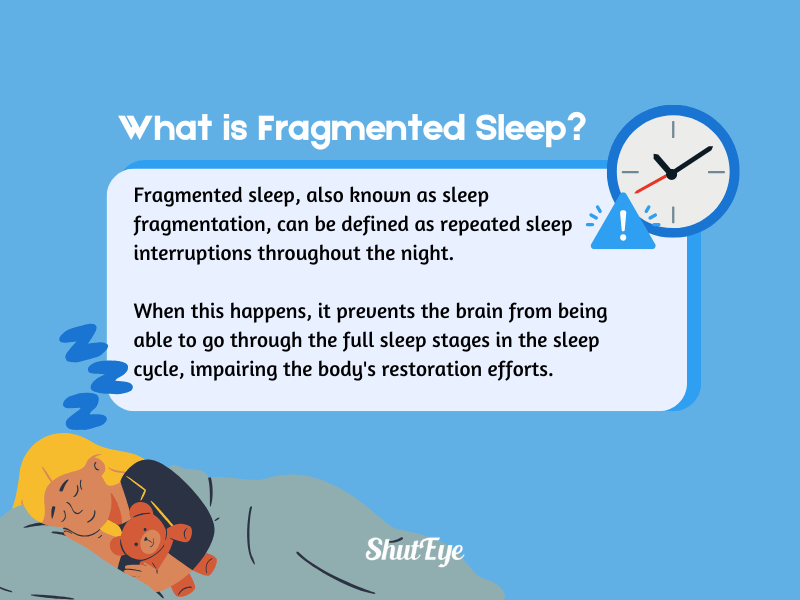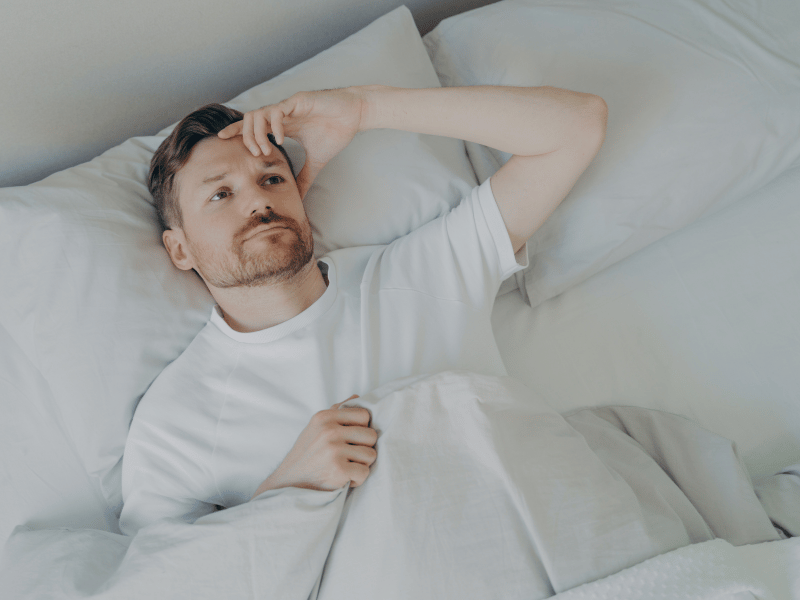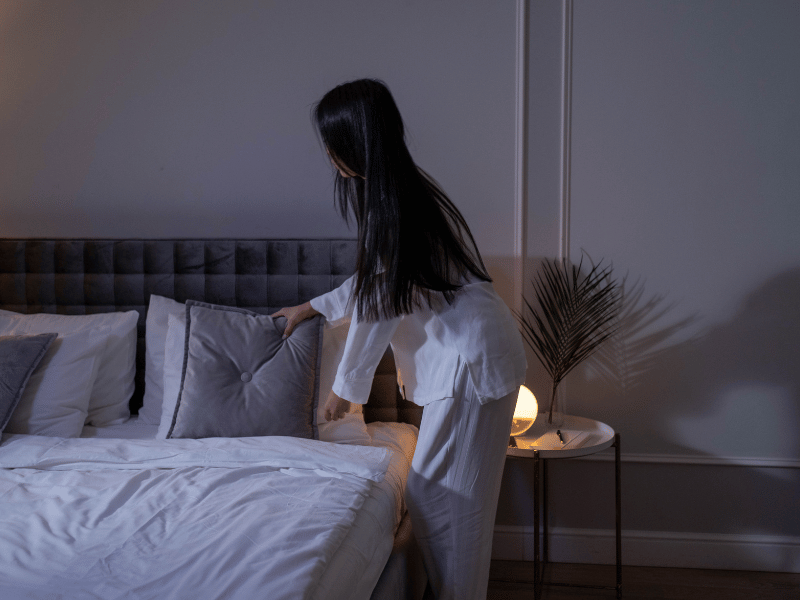


Good sleep quality does not only consist of time spent sleeping, it also consists of how well we can sleep and whether we experienced sleep disruptions. Frequent sleep disruptions can contribute to what’s known as, fragmented sleep.
In this article, we will discuss fragmented sleep, its common causes, and strategies for overcoming it.

Fragmented sleep, also known as sleep fragmentation, can be defined as repeated sleep interruptions throughout the night. When this happens, it prevents the brain from being able to go through the full sleep stages in the sleep cycle, impairing the body’s restoration efforts [1], [2].
This can cause poor sleep quality and excessive daytime sleepiness.
There are many reasons as to why an individual may experience fragmented sleep. Even something as simple as a change in your environment like moving houses or having a newborn baby can lead to sleep disruptions.
Here are 5 common reasons that may lead to sleep fragmentation:

Mood disorders such as anxiety and depression can contribute to sleep disturbances and poor sleep quality. According to polysomnographic studies, it has been found that major depressive disorder is closely connected with abnormal sleep architecture. Diagnosed patients tend to experience frequent awakenings at night, leading to sleep fragmentation [3].

Sleep disorders such as obstructive sleep apnea and periodic limb movement disorder (PLMD) can also lead to interrupted sleep. Obstructive sleep apnea is a block in the airways, causing your breathing to start and stop throughout the night. This obstruction leads to sleep disruptions, affecting your quality of rest.
Periodic limb movement disorder (PLMD) on the other hand, can be characterized as intermittent movements of the limbs during sleep. This can cause sleep arousal or frequent awakenings at night, resulting in disrupted sleep [4].

Practicing good sleep hygiene is one of the effective ways of promoting better sleep quality. They are habits and practices that you may implement to help you get a good night’s sleep. This could be anywhere from your sleep schedule to bedtime routines.
Having an inconsistent sleep schedule, taking too many daytime naps, and using electronic devices before bed are all non-exhaustive examples of poor sleep hygiene practices that may disrupt sleep continuity.
Your sleep environment can be a contributing factor to your sleep problems. Being able to get a good night’s rest often requires a comfortable sleeping environment. This usually means a dark, cool, and quiet space.
Loud external noises, bright light, and a temperature that is too warm may disrupt sleep and cause you to wake up in the middle of the night. Hence, it’s important to take note of how your environment plays an important part.

Your lifestyle habits can also affect your overall sleep quality. For example, eating before sleep, drinking caffeine or alcohol before bedtime and smoking can contribute to difficulty falling asleep and sleep fragmentation.
The body needs between 2 to 4 hours to fully digest so eating right before bed has a high chance of causing indigestion which may lead to sleep disruptions. Caffeine, alcohol, and smoking are also known to be stimulants, which may cause you to be awake more than you should.
Sleep plays an important role in proper brain function and helps with physical recovery. Not getting enough proper sleep without interruptions can primarily lead to sleep loss or sleep deprivation.
Sleep deprivation, be it short-term or long-term, has negative consequences on both our mental and physical health. Some of the short-term consequences include increased stress response, somatic pain, mood disorders, and impaired cognitive functioning.
In the long term, common consequences may include hypertension, heart disease, type 2 diabetes, obesity, and metabolic syndrome [5]. For this reason, it’s important to take the right steps and fix our sleep patterns to ensure that we get enough sleep daily.

If you’re struggling with continuous sleep interruptions, you can take some key steps to address the issue. These strategies include:
Establishing a consistent sleep schedule by waking up and going to bed at the same time each day, even on weekends can help to regulate your body’s circadian rhythm. This consistency will help you to wake up and go to bed much easier and stay asleep for longer.
Try to also avoid napping too much in the day, and focus on doing activities that will help you wind down before bed such as meditating, taking a warm bath, or reading a book.
You can also take steps to improve your sleep environment by ensuring that you are keeping it dark, cool, and quiet. Use sleep products such as earplugs, blackout curtains, or even a white noise machine if necessary.
Sometimes, sleep disruptions or sleep disturbances may be linked to an underlying condition or issue such as sleep apnea, chronic stress, insomnia, or others. Identifying the root causes and addressing them is essential for your long-term well-being. Consider seeking help from a healthcare professional to better understand your condition and what you can do about it.
If self-care strategies and lifestyle changes aren’t providing relief, it may be time to seek professional help. Consider treatment options such as Cognitive Behavioral Therapy for Insomnia (CBT)-I, counseling or other medical interventions based on your needs. Addressing your issues at hand is the best way to improve your sleep issues.
Having fragmented sleep episodes can have significant negative consequences such as sleep deprivation, affecting your overall health and well-being. Incorporating good sleep hygiene practices and lifestyle habits can help you to overcome it, take better control of your sleep, and improve your quality of life.
If you need help getting started on a better sleep journey, try the ShutEye® app. ShutEye uses an expert-approved, advanced sleep-tracking technology to help you track and analyze your sleep cycles so that you can better optimize it. Download FREE for 7 days!
Benkirane, O., Delwiche, B., Mairesse, O., & Peigneux, P. (2022). Impact of Sleep Fragmentation on Cognition and Fatigue. International Journal of Environmental Research and Public Health, 19(23), 15485. Available at: https://doi.org/10.3390/ijerph192315485
Medic, G., Wille, M., & Hemels, M. E. (2017). Short- and long-term health consequences of sleep disruption. Nature and Science of Sleep, 9, 151. Available at: https://doi.org/10.2147/NSS.S134864
Morrell, M. J., Finn, L., Kim, H., Peppard, P. E., Badr, M. S., & Young, T. (2000). Sleep fragmentation, awake blood pressure, and sleep-disordered breathing in a population-based study. American journal of respiratory and critical care medicine, 162(6), 2091–2096. Available at: https://doi.org/10.1164/ajrccm.162.6.9904008
Murphy, M., & Peterson, M. J. (2014). Sleep Disturbances in Depression. Sleep Medicine Clinics, 10(1), 17. Available at: https://doi.org/10.1016/j.jsmc.2014.11.009
Ting, L., & Malhotra, A. (2005). Disorders of Sleep: An Overview. Primary Care, 32(2), 305. Available at: https://doi.org/10.1016/j.pop.2005.02.004